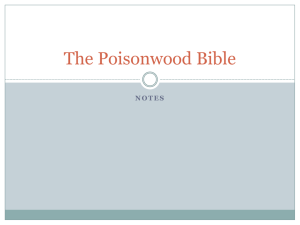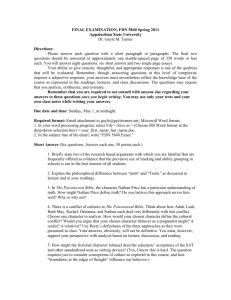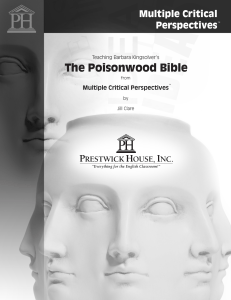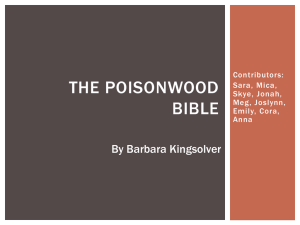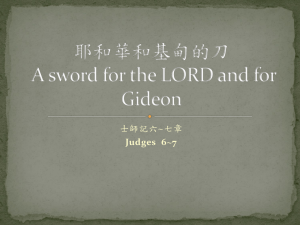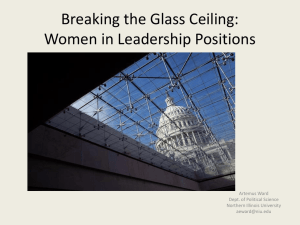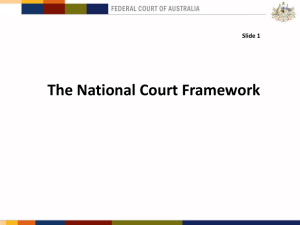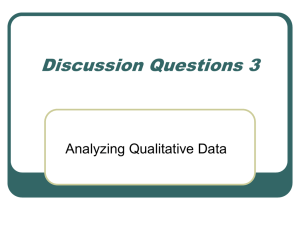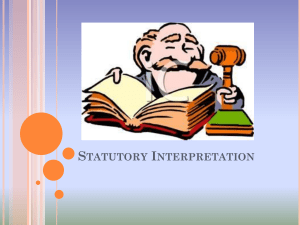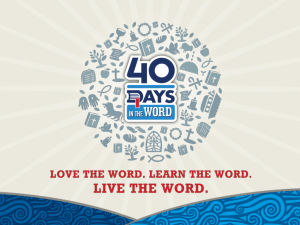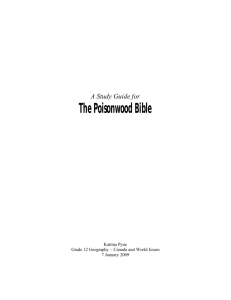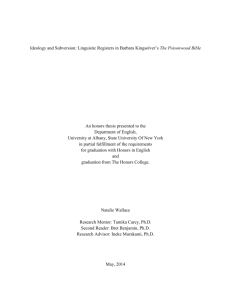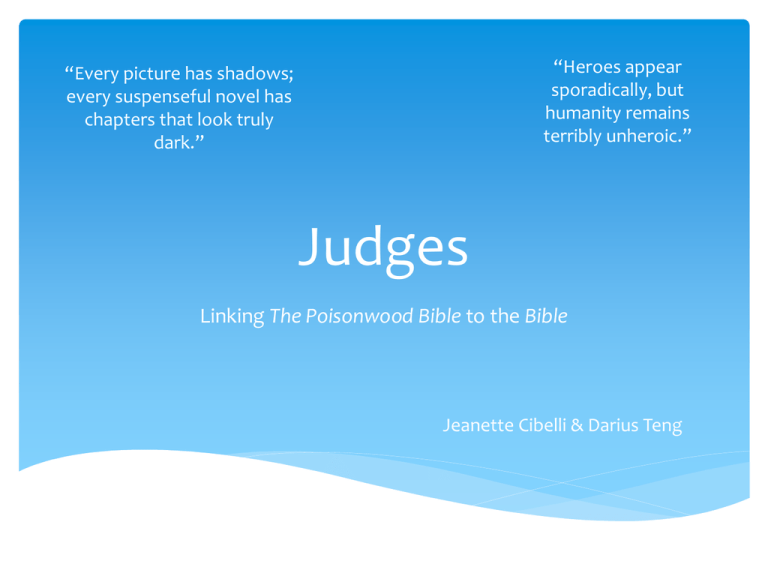
“Heroes appear
sporadically, but
humanity remains
terribly unheroic.”
“Every picture has shadows;
every suspenseful novel has
chapters that look truly
dark.”
Judges
Linking The Poisonwood Bible to the Bible
Jeanette Cibelli & Darius Teng
Synopsis of the Book of Judges
Dark stories of the Bible
Israelites conquer Canaan but fail to rid the land of the
natives
Israelites become corrupted by intermarriage & deity worship
God sends a series of judges to Canaan to revive their lost
faith
Ehud, Deborah, Gideon, Jephthah, Samson, & others
Judges temporarily alleviate corruption, but sin restarts
after their deaths
Cycle of sin shows God’s undying faithfulness
Judges 2:18-19
‘Whenever the LORD raised up a judge for them, he was
with the judge and saved them out of the hands of their
enemies as long as the judge lived; for the LORD had
compassion on them as they groaned under those who
oppressed and afflicted them. But when the judge died,
the people returned to ways even more corrupt than
those of their fathers, following other gods and serving
and worshiping them. They refused to give up their evil
practices and stubborn ways.’
“Then the Israelites did what was
evil in the sight of the Lord and
worshipped the Baals; and they
abandoned the Lord…they
followed other gods, from among
the gods of the peoples who
were all around them, and bowed
down to them; and they
provoked the Lord to anger.”
“Then the Lord raised up judges,
who delivered them out of the
power of those who plundered
them.”
“But whenever a judge died, they
would relapse and behave worse
than their ancestors…”
What’s happening in Poisonwood?
Orleanna reveals Nathan’s past of war as explanation for
his God-fearing demeanor
Daughters struggle with hunger, sickness, inequality, &
gradual loss of faith in God and Nathan
Leah & Adah better understand Congolese culture
Appearance of Brother Fowles encourages Orleanna to act
(though she does not yet rise up against Nathan)
The ants test the village’s (& particularly the Prices’) faith
Political struggle with Lumumba & the Republic of the
Congo
Situational Parallels
Bible
Israel conquers Canaan but
does not defeat natives
Allows native, non-Christian
culture to continue
Israelites accept the culture of
the people; they succumb to
intermarriage & deity worship
of the land
Poisonwood
Israel = Western nations (USA,
Belgium) conquer the Congo
Do not rid land of Congolese &
their customs
Brother Fowles intermarries &
learns to respect native customs,
Leah begins to question her faith
in her father and falls in love with
Anatole, Adah becomes fascinated
by the principles in understanding
Lingala
“Corruption” of the Colonists
“If his decision to keep us here in the Congo wasn’t right,
then what else might he be wrong about? It has opened
up in my heart a sickening world of doubts and
possibilities, where before I had only faith in my father and
love for the Lord.” (Kingsolver 224) - Leah
“I’ve been here so long, I’ve come to love the people here
and their ways of thinking.” (248) – Brother Fowles
Consequences of Sinning
‘And the anger of the LORD was hot against Israel; and he said, Because that this
people hath transgressed my covenant which I commanded their fathers, and
have not hearkened unto my voice; I also will not henceforth drive out any from
before them of the nations which Joshua left when he died: That through them I
may prove Israel, whether they will keep the way of the LORD to walk therein, as
their fathers did keep it, or not.’
Judges 2:20-22
“God works, as is very well known, in mysterious ways…He will send down so
much rain that all his little people are drinking from one another’s sewers and
dying of the kakakaka. Then he will organize a drought to scorch out the yam
and manoic fields, so whomever did not die of fever will double over from
hunger.” (217) - Adah
Situational Parallels Cont.
Bible
Poisonwood
God calls for judges
Brother Fowles and Nathan (&
possibly other unknown
missionaries) go to save the Congo
with Christianity
When a judge falls, foreign
powers (not with Israelite
interests) rule again constant
struggle for God to rule
Struggle with government of
Congo they want to rule
themselves
Contrasts
Bible
Poisonwood
Judges successfully guide
Israelites back towards
worshipping God
Brother Fowles fails by intermarrying
and respecting Congolese culture,
Nathan fails by being too stubborn to
accept Congolese culture – because of
this he becomes blind to his faults
“Watching my father, I have seen how
you can’t learn anything when you’re
trying to look like the smartest person
in the room” (229) - Leah
The death of corrupt kings or
enemies brings peace to the
land
The death of Lumumba brings suffering
to the Congolese
“For now, the only honorable
government work is the matter of
bringing it down” (466) – Anatole
through Leah
Parallel Judges
Bible:
Samson
Strong, temperamental,
lustful, faithful
Chosen by God to overcome
the Philistines
Spoke in riddles that angered
people of Timnah
Falls in love with Delilah, who
betrays him by telling the army
to cut his hair
Takes away his strength
Last faithful act to God was
dying with the Philistine rulers
Poisonwood: Nathan
Strong, temperamental, lustful,
faithful
“Nathan was made feverish by sex, and
trembled afterward, praying aloud…”
(198)
Feels himself called to Congo
Wasn’t necessarily chosen by God
Does not respect native customs, so
he angers the people
No literal fighting, but he works to
overpower the un-Christian
population
Orleanna betrays him when she
leaves
Takes away his strength
Dies amongst the foreigners out of
commitment to his cause
Political Parallels
Bible
Israelites living under foreign
power
King Jabin of Canaan rules over
betrayal amongst his people
Jael kills Sisera
Jabin given too much power
too soon, so God removes him
God allows foreign powers
(Midian, Philistines) to
periodically oppress them as
punishment for sin
Then sends judges to deliver
them
Poisonwood
Prices live under Congolese
power
King Jabin= Lumumba
Lumumba represents Congolese
interests, not Western (Israeli)
Lumumba not necessarily in
direct fault for what happens
under his presidency
Replaced with Western interests
Midian & Philistines= Republic of
Congo natives attempting to
take back power
US sends rulers to protect
Western interests, just as God
sent judges to protect
Christianity
Main Differences
Bible
Poisonwood
the judges save the Israelites by
teaching them to stop their sinful
ways (prostitution, polygamy,
polytheism)
the equivalents of the judges
(Nathan, Fowles, Mobutu) all fail
in some way
Nathan and Mobutu, instead of
bringing peace to the Congo, do
the exact opposite – they disrupt
the lives of the Congolese
Christianity=good
Christianity= ?
Main Idea
This section in The Poisonwood Bible is a reversal of what happens in
the Holy Bible.
Christianity in this story is portrayed in a negative light. It harms rather
than heals.
This is to show that the insistence on imposing a “superior” culture on
others fails and causes damage instead.
The message is that people cannot impose their culture or beliefs on
others and expect them to react positively.
Works Cited
Kingsolver, Barbara. The Poisonwood Bible. Harper Perennial Modern
Classics ed. NY: HarperCollins, 2005. Print.
“The Book of Judges." King James Bible. N.p., n.d. Web. 15 Sept. 2012.
<http://www.kingjamesbible.com/B07C001.htm>.
"The Message of Judges." Jesus Plus Nothing: Christ Centered Bible
Study. N.p., n.d. Web. 19 Sept. 2012.
<http://www.jesusplusnothing.com/studies/online/judges1.htm>.

